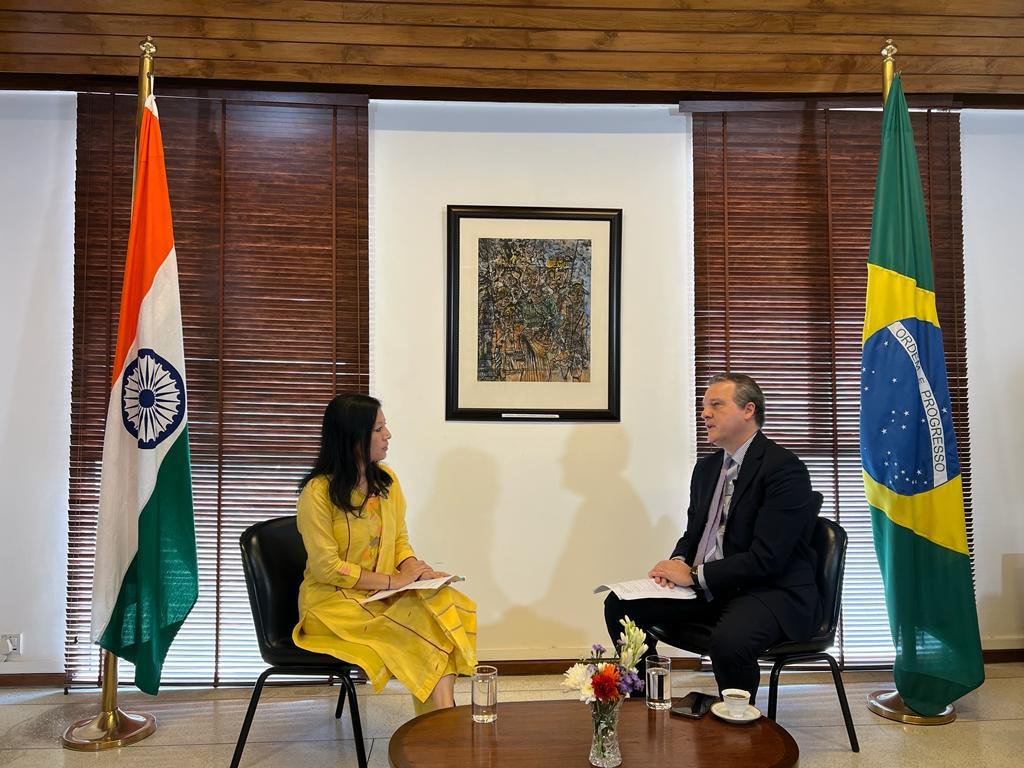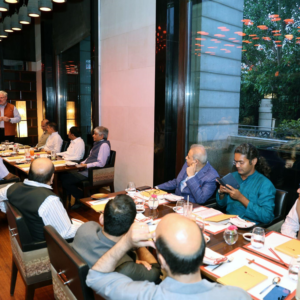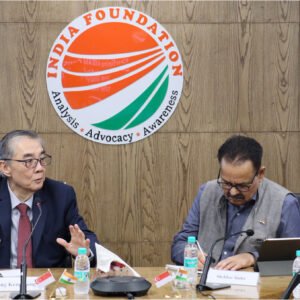Shristi Pukhrem: It is indeed a very interesting time for India and as India is about to host the G-20 Summit but India also recently participated in the BRICS summit. So, what are the main takeaway for the Brazilian government from the recently concluded BRICS Summit 2023 in Johannesburg?
Amb. Kenneth H. da Nobrega: The main takeaway is undoubtedly the expansion of the group. We are quite satisfied with the inclusion of important partners of Brazil in the group, and the mere fact that approximately 30 countries are interested in joining the group speaks in and of itself, and perhaps it sends some messages to the world at large. First, I think an urge to concretise inclusiveness and multipolarity in the world. I think also an interest for new spaces of discussion and new spaces for consensus building and so on. And of course, it also signals those multilateral institutions of governance are not delivering, perhaps what they should deliver peace and security, inclusiveness, concrete actions in facing the global challenges of the majority of humanity, meaning food security, access to energy, fighting poverty and also fighting climate change in the sense of not only mitigation of climate change, but also adaptation to climate change. So, I think this very solid interest in becoming a member of BRICS conveys a very strong message to the world.
Shristi Pukhrem: How does Brazil see and analyse the official declaration and the concrete decisions that has been made at the BRICS 2023 Summit?
Amb. Kenneth H. da Nobrega: We are quite satisfied. When the debate was going on in Brazil regarding the siding with the countries within BRICS who wanted to push for an expansion, other countries were not so convinced, President Lula was one of the first to say that the expansion is a good thing and BRICS does not exist to compete. BRICS is there for inclusion not competition.
Shristi Pukhrem: Brazil takes over as the G-20 chairmanship next year. Brazil wishes to increase the Latin Americas role in BRICS, and with the recent expansion of membership, we saw that Argentina’s inclusion is the first step in that direction. So how does Brazil see the inclusion of new members in BRICS, and what effects could this expansion according to you have on the global economic order overtime?
Amb. Kenneth H. da Nobrega: There was a previous discussion among members of BRICS regarding the criteria for meeting new partners and for Brazil geographical diversity was one of the main criteria that should be taken into account. So, for us it’s more than natural that Argentina becomes a member of BRICS. It’s one of our main partners, is a South American country, is a member of G-20, but also when we speak of geographical diversity, we also favoured including countries from the Middle East, from Africa, from Asia. So, we are quite satisfied with the results and of course an expanded BRICS is a group with more economic clout. It represents a large part of the world and of humanity, and it has spread geographically. So, all these factors sum up to having a more influential group.
Shristi Pukhrem: So, does Brazil see the MERCOSUR bloc getting institutionally connected with BRICS. Will it be a natural process that MERCOSUR and BRICS will be naturally connected now that its two largest members, Brazil and Argentina, both are in the BRICS?
Amb. Kenneth H. da Nobrega: Well, MERCOSUR is a formal international organization. BRICS, is a well-established coordination group of countries which are like minded in more than one aspect. So, I do not see how these countries could establish formal relations, institutional relations, but we cannot discard in the future. For example, the establishment of a permanent dialogue mechanism between MERCOSUR and BRICS, not a formal one because these are two different groupings with different agenda.
Shristi Pukhrem: What do you think are the main factors driving interest in BRICS, especially across the Global South?
Amb. Kenneth H. da Nobrega: The factors that are widely spoken and which has attracted so many countries are inclusiveness and multipolarity. The Global South is conveying a message that it needs to be included more in the big clubs with the big countries. So, in BRICS, you will find, and I can say that because I was a former sous-sherpa of BRICS, you find an atmosphere, a dynamism where you can really interact and put forward your priorities and then there is a very solid and consolidated spirit of trying to build consensus. Sometimes the consensus is very complex to build, but the spirit of wanting to reach consensus is an important political dimension of the inside dynamics of BRICS.
Shristi Pukhrem: So, when we are talking about Global South, do you see a contestation occurring in the near future between Global South and Global North?
Amb. Kenneth H. da Nobrega: From the Brazilian point of view, President Lula has made that very crystal clear is that BRICS is there for inclusion, not for competing with G-7 for example. BRICS for us it’s not anti-West. We don’t think that G-7 is anti-South. It’s not in the spirit of our diplomacy, never has been.
Shristi Pukhrem: How will the BRICS financial institutions help further in mobilizing resources for infrastructure and sustainable development projects, mainly in emerging markets and in developing countries?
Amb. Kenneth H. da Nobrega: The new BRICS bank or the New Development Bank (NDB), is part of the family of multilateral banks or multilateral institutions. So, it aims at joining forces with other multilateral institutions in order to provide more financing, more financial products, diversified financial products for the developing countries, and we know that this is complex because after the pandemic, after quite an uneven recovery, unbalanced recovery of economies throughout the world after the pandemic. To develop financial products which can preserve the financial solidity of the multilateral banks and at the same time take into account the needs of countries who need financing but have some challenges regarding balancing budget, regarding implementing social policies against hunger, against poverty. So, what I can say about it is, first NDB wants to join forces with other multilateral banks. Second, it wants to really listen to the Global South. BRICS is a locus where you can mainstream this discussion and on the basis of this discussion, we can develop good financial products as per the needs of the developing world. And also, financing is a very important pillar of promoting development. Another important pillar is trade and in the declaration on the occasion of the Johannesburg summit, BRICS has shown concerns with neo-protectionism, which has been introduced on the basis of environmental concerns. Of course, we are not saying that the environmental concerns are not legitimate concerns. The point is how this is going to be implemented, because I would doubt whether when you introduce new barriers and regulations to trade on the basis of environmental concerns, when you do that you have to bring into the discussions also the pillars of climate change law, meaning common and differentiated, the principle of common and differentiated responsibilities, because if you put a barrier against an export of a small country who has historically contributed zero to climate change, but has an industry which has kind of heavier carbon footprint. This country will not be able to export to important markets in the world. So, trade as a channel to induce growth and produce development which is so important for developing countries can be blocked by this kind of neo-protectionism. So, I am not saying that environmental concerns are not important. But let’s do this really with care and understanding that what you are causing or what are the consequences to the Global South when you introduce this kind of barrier.
Shristi Pukhrem: How would Brazil define the role, scope, and potential of the new 11 member BRICS? And we see that there are more than 20 more candidates who are interested to join this grouping.
Amb. Kenneth H. da Nobrega: Diversity is part of the Brazilian DNA, and we favour diversity. The idea that the BRICS is becoming more diverse means that more ideas, more concerns are becoming part of our internal discussion. And also, we can claim more legitimacy in terms of the consensus we will build within this enlarged group. We are not saying that BRICS will be an alternative to the reform of the multilateral international government institutions. We are not saying that it’s an alternative. I think it’s a group which can contribute in the spirit of building blocks.
Shristi Pukhrem: With the new 11-member grouping, do you see BRICS as a non-aligned movement or a block capable for providing a better balance in the G-20 and the UN Security Council, and maybe pushing for the reform of the UNSC?
Amb. Kenneth H. da Nobrega: I am a bit cautious when it comes to establishing these historical analogies. We should try to understand facts and situations which happened in different period of times. Submitting these facts to a same paradigm of thought, can limit our capacity of analysis in the sense of seeing unprecedented things happening. I would say that of course the non-aligned movement was created in a moment of big global challenges and BRICS was created as a response to the need of making more countries heard, having their concerns heard in the multilateral fora and as a groups which tried to chart new courses, offering different alternative solutions to global challenges. So, we could perhaps envisage some points of contact between the two initiatives. But I would be cautious in drawing conclusions based on an analogy.
Shristi Pukhrem: How do you see India and Brazil bilateral relations in the global multilateral order?
Amb. Kenneth H. da Nobrega: Our bilateral relations are 76 years old, started in 1947. Throughout these 7 decades we coordinated consistently, in a very consistent and continuous way in all multilateral forum. I think that all Brazilian diplomats who have been active in the last 40 years in multilateral fora, having engaged in coordination with their Indian colleagues which has built trust and confidence between Brazilian and Indian diplomacy. Both countries are of sheer size together –GDP, population, biodiversity, importance in the climate change debates on negotiations throughout the world. We are the two largest democracies in the Global South. With all these assets we can be mainstays in debating multilateral fora and in many groups in the G-20, within BRICS, within IBSA and G-4 and so on, we can really make a contribution and claim that we are legitimate players because we represent a sizeable part of humanity, and also because India has been traditionally very vocal in multilateral fora in defending and presenting the claims and the plight of the developing world. So, I think that we can make a difference together.
Shristi Pukhrem: India is hosting G-20 in next few days and the next chairmanship of G-20 is with Brazil. So, what are the key expectations or what will be the key takeaways from this summit as we pass on the chairmanship to Brazil next year?
Amb. Kenneth H. da Nobrega: One important takeaway is continuity and I think we will see continuity in the way we see inclusiveness, multipolarity and also mainstreaming the concerns and the challenges faced by the Global South, because, after all, it’s the majority of humanity that lives in the Global South.
Brief Bios:
His Excellency Mr. Kenneth H. da Nobrega is Ambassador of Brazil to India.
Dr. Shristi Pukhrem is Senior Research Fellow, India Foundation.




